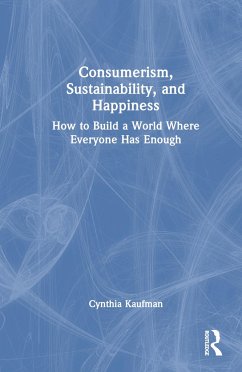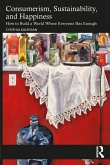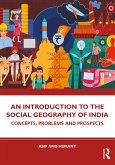What would it take to have a world where everyone had enough? How can we eliminate poverty, leave enough for non-human nature, and increase wellbeing? This book explores ways the reader can live their life, engage with cultural change, and engage with policy making, to build that world.
"Cynthia Kaufman captures the essence of the intertwining crises that embroil our world: excessive and wasteful consumption patterns that fuel growing inequalities, political conflict, subjective feelings of emptiness, and the climate catastrophe that threatens life itself. She maps out a range of viable and achievable solutions capable of challenging structures of domination and ameliorating our plight. This book is a must read for those seeking answers to a range of pressing contemporary conundrums, one that will have relevance for years to come."
Ron Hayduk, Professor of Political Science, San Francisco State University
"In these dark times, Cynthia Kaufman's book, Consumerism, Sustainability, and Happiness, brilliantly illuminates a pathway to a better world. It is not an easy path; it goes through rough terrain and requires overcoming obstacles created by vested interests. But with her careful, calm, and hopeful arguments, Kaufman persuades us that it is a path that we must follow."
Fred Block, Research Professor of Sociology, University of California, Davis
"Philosopher Cynthia Kaufman helps us understand how our lives can be more complete with less. In another compelling book that combines ideas and practice, she makes changes in our living "standards" look as easy as they are essential. A must read for the perplexed as well as the committed."
Kathryn Sklar, Author of Florence Kelley and the Nation's Work
"Cynthia Kaufman's new book Consumerism, Sustainability and Happiness: How to Build a World Where Everyone Has Enough is exactly what we need in today's fight for climate and environmental justice. Kaufman's tactical approach is a breath of fresh air, providing practical solutions to not only help us live more sustainably as individuals, but also to push for the needed systemic change that will help us achieve a more just and livable future for all. Centering the topics of happiness, poverty, and environmental sustainability for what it would mean to have "enough" and feel satisfied in our lives, Kaufman emphasizes discourses that we need to see more popularized in mainstream and environmentalist circles: the centering of wellbeing, valuing people over profits, reducing work time, the causes and historical legacies of poverty, capitalist logics that keep us from achieving our best potential as a human species, and the fallacies of the overpopulation issue, to name a few. Importantly, Kaufman also stresses the significance of individual action as a way to create cultural change, while also eschewing narratives of individual consumer responsibility as the sole way to make systemic change. Indeed, this book makes transparent how powerful structural forces upheld by many institutions today can be challenged and held accountable. Kaufman's writing is clear, approachable, and boils down difficult concepts so that anyone can immediately start acting in more sustainable ways and challenge existing power structures so as to help bring about a just transition."
Belinda Ramírez, PhD, Stanford University Civic, Liberal, and Global Education (COLLEGE) Fellow
Ron Hayduk, Professor of Political Science, San Francisco State University
"In these dark times, Cynthia Kaufman's book, Consumerism, Sustainability, and Happiness, brilliantly illuminates a pathway to a better world. It is not an easy path; it goes through rough terrain and requires overcoming obstacles created by vested interests. But with her careful, calm, and hopeful arguments, Kaufman persuades us that it is a path that we must follow."
Fred Block, Research Professor of Sociology, University of California, Davis
"Philosopher Cynthia Kaufman helps us understand how our lives can be more complete with less. In another compelling book that combines ideas and practice, she makes changes in our living "standards" look as easy as they are essential. A must read for the perplexed as well as the committed."
Kathryn Sklar, Author of Florence Kelley and the Nation's Work
"Cynthia Kaufman's new book Consumerism, Sustainability and Happiness: How to Build a World Where Everyone Has Enough is exactly what we need in today's fight for climate and environmental justice. Kaufman's tactical approach is a breath of fresh air, providing practical solutions to not only help us live more sustainably as individuals, but also to push for the needed systemic change that will help us achieve a more just and livable future for all. Centering the topics of happiness, poverty, and environmental sustainability for what it would mean to have "enough" and feel satisfied in our lives, Kaufman emphasizes discourses that we need to see more popularized in mainstream and environmentalist circles: the centering of wellbeing, valuing people over profits, reducing work time, the causes and historical legacies of poverty, capitalist logics that keep us from achieving our best potential as a human species, and the fallacies of the overpopulation issue, to name a few. Importantly, Kaufman also stresses the significance of individual action as a way to create cultural change, while also eschewing narratives of individual consumer responsibility as the sole way to make systemic change. Indeed, this book makes transparent how powerful structural forces upheld by many institutions today can be challenged and held accountable. Kaufman's writing is clear, approachable, and boils down difficult concepts so that anyone can immediately start acting in more sustainable ways and challenge existing power structures so as to help bring about a just transition."
Belinda Ramírez, PhD, Stanford University Civic, Liberal, and Global Education (COLLEGE) Fellow









